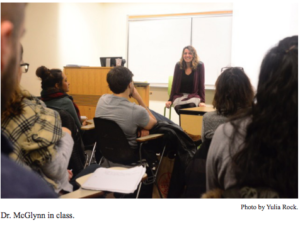McGlynn Studies, Teaches Different Forms of the English Language
 Although English is spoken around the world and is considered the main means of communication in commerce, science, and many other fields, the language has humble origins and a complicated story.
Although English is spoken around the world and is considered the main means of communication in commerce, science, and many other fields, the language has humble origins and a complicated story.
With roots in the southern part of England, drawing from French, German, and Scandinavian languages, English began to spread around the world as the British began colonizing. First it was Wales, then Scotland, Ireland, Australia, the United States, South Africa, India, and elsewhere around the globe.
Dr. Mary McGlynn studies the different forms of English. “There were places that had a native language, like the Caribbean, and then their original languages were replaced or English became the lingua franca; we speak of those places as Anglophone because the speak English,” says McGlynn.
A native of Lubbock, Texas, she came to New York City after getting a bachelor’s degree at the University of Texas at Austin. Her idea when coming to the Big Apple was to study English at Columbia University and that was when she had her first experience of feeling like a foreigner.
“When I came up to New York, I had the experience of sitting in a classroom on my very first day of graduate school; everybody’s doing the introductions, and as I open my mouth to speak, despite not having a very strong accent, I said the word ‘y’all,’ and I could see everybody around the table react,” says McGlynn.
For her that was an eye-opening experience. “There was something about that feeling of your language making you ‘other,’ something that’s invisible when you’re quiet but visible when you speak, that got me very interested particularly in pronunciation, dialect and how that is represented on the page, and that was added to this Irish tradition of experimentation.”
After obtaining two masters and one doctorate degree from Columbia University, she became a world expert in Anglophone culture. “I was always interested in Irish literature from the first moment I read James Joyce. I knew that this was something that I needed to spend time with. Because very often people who are writing dialect fiction are taken to be scribes who are just transcribing what they hear, whereas an experimental tradition is trying something new,” says she.
McGlynn is now an Associate Professor in the Department of English in the Weissman School of Arts and Sciences at Baruch College of the City University of New York and one wonders how the millennials who attend her classes feel about these issues.
“I’ve taught an entire course on the modern short novel that’s all Scottish novels, and you think, ‘you’re not of this heritage, you don’t know about this place;’ and I think there is such a tendency to believe that area studies are supposed to be a place where you study your own culture, but the students at Baruch have a broader perspective than that,” she says.
“If you ever watched TV shows that are set in different parts of the British Isles,” continues McGlynn, “you see that some of the accents can be very hard to understand for people who are from somewhere else, and sometimes they’ll even be subtitled. Some of that is about pronunciation, and some of it is about real linguistic difference.”
The way we employ language is also a way to showcase authenticity. “The first reaction I have is that I feel the ability of beautiful language to take my breath away comes most from texts where people are writing with a consciousness of their position as somehow on the margin.”
Thus, it is not surprising that her favorite American author is William Faulkner, who wrote from the position of a Southern writer. “Many times great literature actually comes from people who are writing on the peripheries and not from the supposed seats of canonical power.”
She is particularly interested in how English evolved in Ireland and what that means in terms of culture and politics. “I’m teaching an Irish film class. My students do oral presentations after watching horrible Irish movies, things that use Irish characters as stereotypes, and it is something that you can trace really through the entire history of American and British films.”
Many of her students represent multiple cultures. “I don’t think they feel as limited: ‘Oh because I’m Dominican I’m going to take a class in Hispanic studies.’ There’s an openness to explore these things, and also they’re very interested in the colonial analogies. One of the things we see throughout Irish films is the persistent attempt to equate Irish culture and African American culture. So I have a number of students in my class this semester who have become quite interested in the problems with that analogy and the way it doesn’t really work.”
McGlynn is currently working on two different book projects. One is about Irish fiction since the economic crisis and particularly the way that the form of these novels responds to the economic situation. The other is about old detective fiction, an idea she developed while reading that genre during her leisure time.
“I noticed in a lot of British detective novels a discourse of class that looked more to me like the way we talk about class in the United States, this effort to erase class and not talk about it in this very entrenched sense that the British have tended to do over the generations, and you can start to see this even in the 1920’s. And so what I started to look at was the way that the idea of meritocracy starts to replace aristocracy in the British Isles in the 20th century in the detective fiction and in the figure of the detective in particular.”
PDF Version:
McGlynn Studies, Teaches Different Forms of the English Language